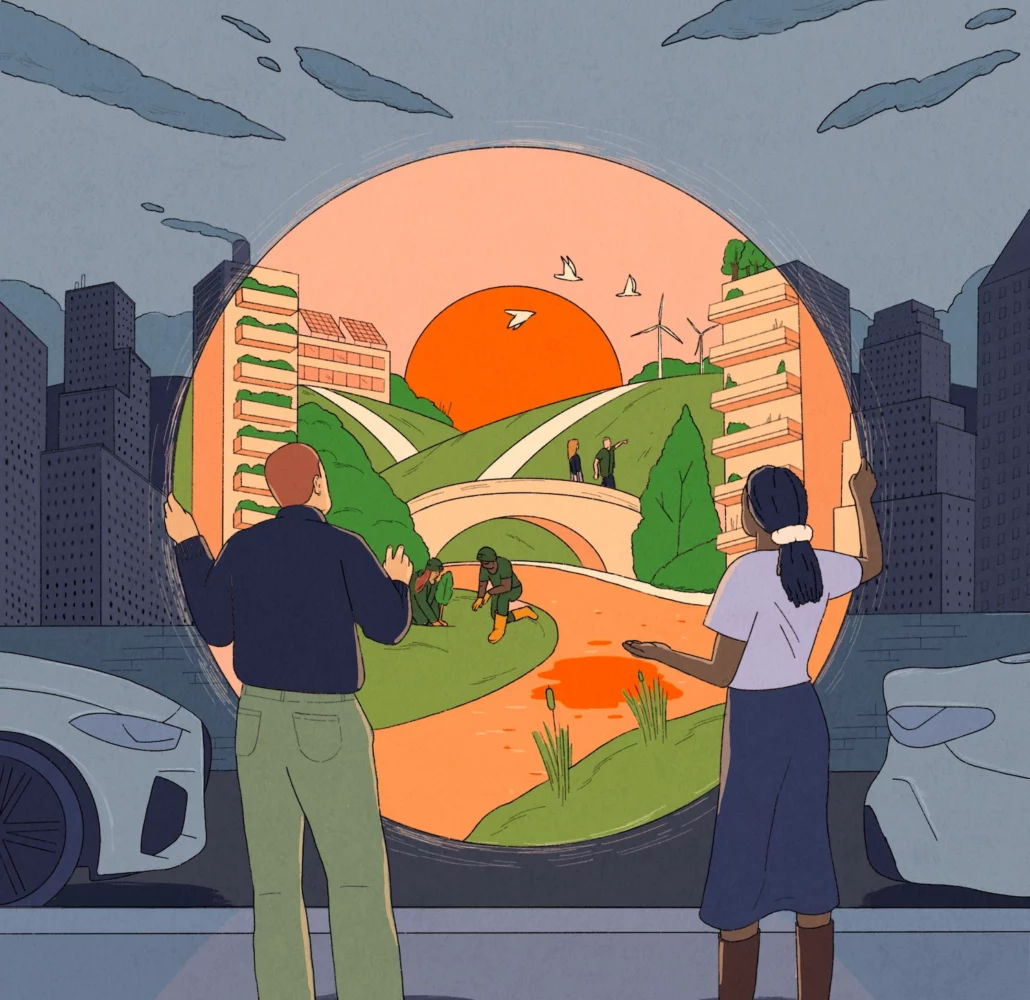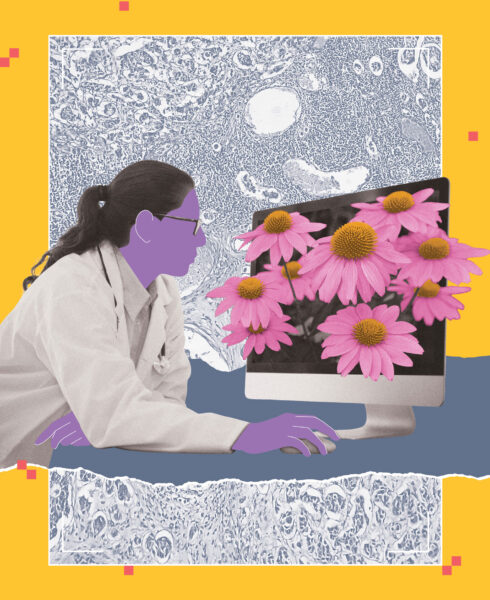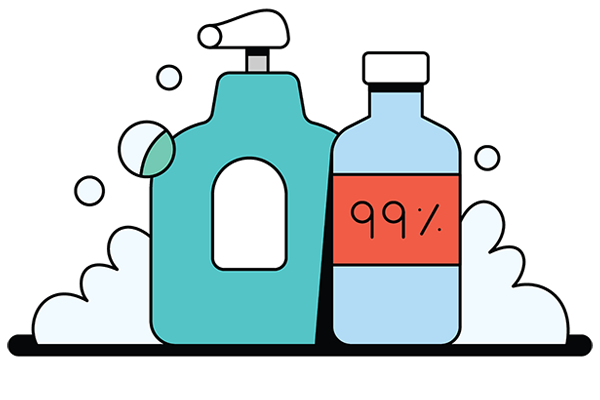In downtown Toronto, on the rooftop of Toronto Metropolitan University’s (TMU) engineering building, the Urban Farm team spends the summer harvesting food they’ve grown from seed. This small-scale project is one big stride toward a more sustainable urban life, and it’s been the inspiration for much of Engineering Professor Kristiina Valter Mai’s work. “I’ve been interested in environmental sustainability since childhood,” she says.
But it was working with the Canadian astronaut program and seeing images of earth from space that showed her just how incredibly special earth really is. “It opened my eyes to what it’s like to be away from this planet and it gave me a whole new perspective. It’s our home, and I saw how beautiful and nourishing it can be, and we really need to respect it,” she says.
She’s since been using her expertise to improve health outcomes for people, and sees urban farming as a great way to do so. Food-producing roofs alleviate urban heat islands and reduce greenhouse gas emissions from food transportation. They also address critical issues of food security.
“I envision a future model of these oases of food forests within the city where community groups come together,” Valter Mai says.
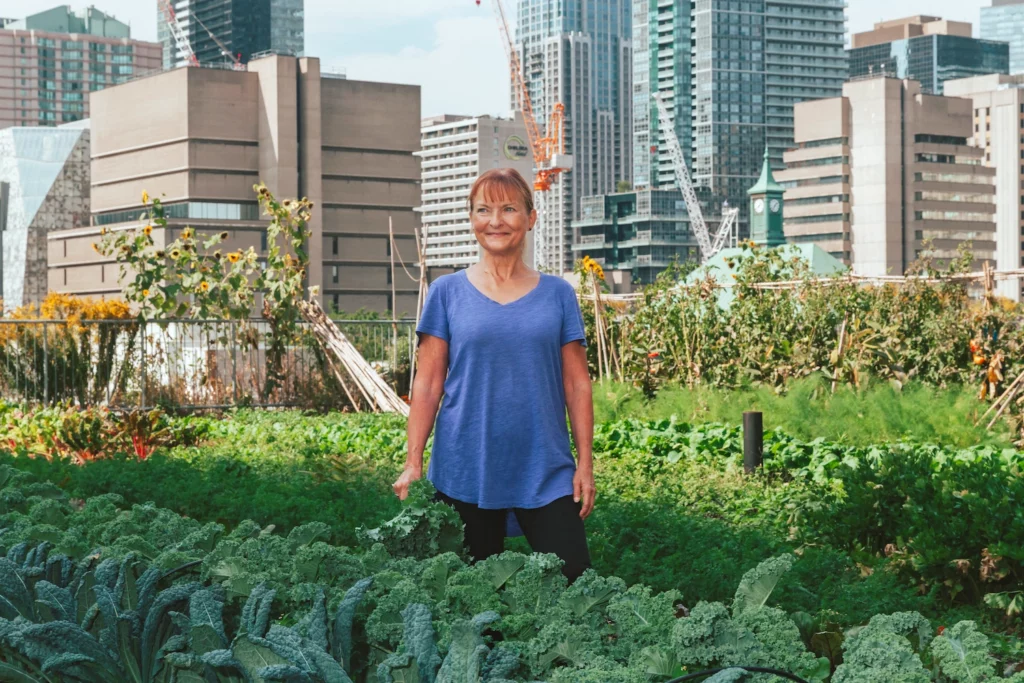
Kristiina Mai credits her partnership with the Urban Farm for advancing her work around the city. Photo by Wynne Neilly
“Knowing what we have at TMU with the Urban Farm, it made sense to me that we should have more food producing green roofs in the city,” she says. “People need to eat, and we understand from UN studies that most of the world's population now lives in urban centres. If you have that food growing on your own rooftop or on your building's rooftop, then you can be involved in the process,” she says.
She spent some time last summer looking around the city for rooftops that could grow food. She found the community centre next to Kimbourne Park United Church, where there’s a well managed community garden and a bare roof that could lend itself to urban farming. They are looking for a sponsor, and see the project as a way of addressing several of the UN Sustainable Development Goals for 2030: zero hunger, good health and well-being and sustainable cities and communities.
“For me, it’s the most sovereign way of obtaining food,” says Valter Mai. “It’s a demonstration of what’s possible. I'm really thrilled to have the opportunity to make a difference for people who are really struggling to make ends meet. The need for healthy food is greater every day.”
Passion project grows
Across the globe in Lima, Peru, TMU alumnus Andres Bustamante (Commerce `10) navigates the tides of sustainable change through EcoSwell, a Peruvian NGO he co-founded with a group of his childhood friends. “It happened organically,” recalls Bustamante, who returned to his native Peru from Canada, where he was working a grinding tech job on Bay Street. He found that all his friends had turned to surfing. “When you’re a surfer, you connect a lot with the natural environment because you're right in the ocean. You also connect a lot with the communities that you go visit,” he says.
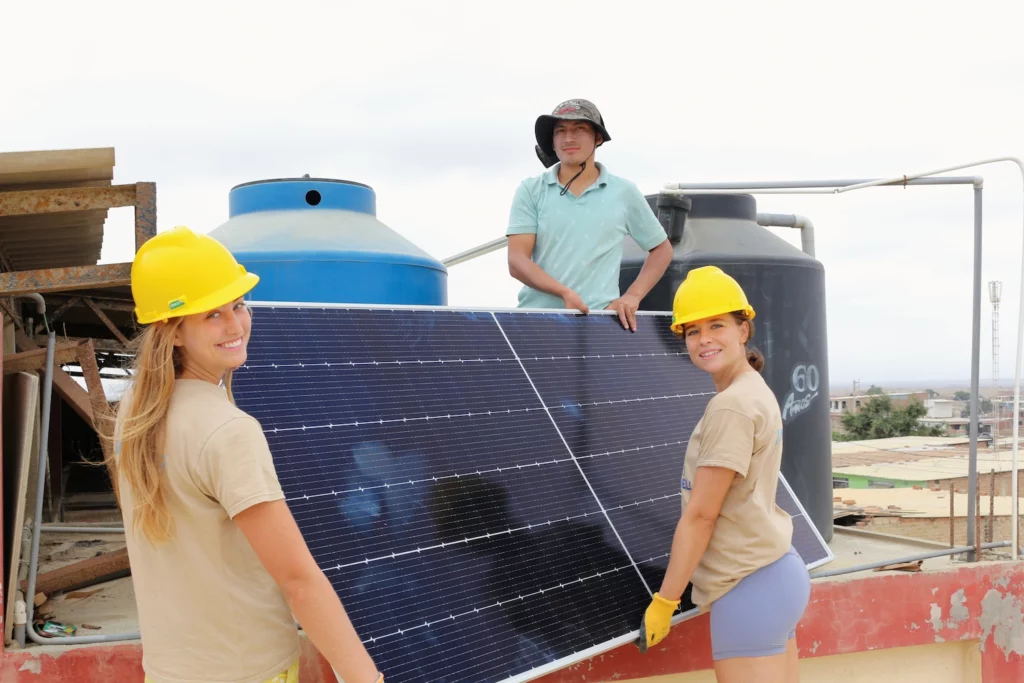
Starting with small energy provision projects in a surf town in Peru, Bustamante's EcoSwell has now set their sights on bigger installations, including keeping medical facilities powered.
On a surf trip with his friends, he was struck by the lack of access to energy and the environmental degradation he saw in the surf town of Lobitos. “We had a lot of passion, and we were very idealistic, as most young people are. We wanted to help,” he says. Bustamante and his friends built relationships with the local community to identify urgent needs, starting with a modest but impactful project: installing solar-powered lights on a fishing pier for local fishermen.
“We hadn’t done anything like this before, so we weren’t sure how to start,” Bustamante recalls, saying that the four friends were bootstrapping each project themselves while maintaining full-time jobs in the city. But when they started to see their hard work gaining traction, they all made the move to build EcoSwell as a full-time project.
Today, EcoSwell’s projects range from renewable energy installations in medical centres to decentralized microgrids providing households with electricity for the first time. “Being able to have a fridge, nutrition, a business, access to the internet – these are what really drive me right now,” Bustamante explains.
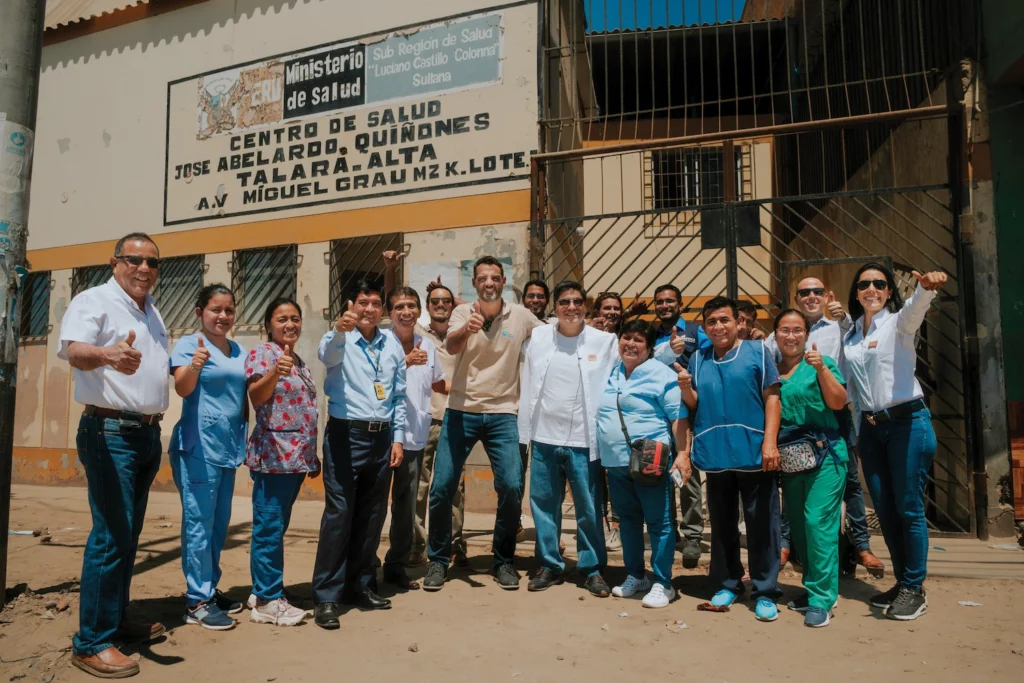
EcoSwell seeks to give back to the communities in which they work, hiring locals for as many pieces of each project that they can.
Bustamante’s approach underscores the critical leverage that grassroots initiatives can exert on broader sustainable development goals. "We're trying to leave as much money as we can in the local economy," he says. By hiring local tradespeople, EcoSwell channels much-needed funds into the community, fostering both economic growth and social empowerment.
Bustamante is hoping that he can get more students involved, including from TMU, for experiential learning opportunities unlike any other. “I think when you see how a grassroots project has an impact directly on communities, you really see the power of energy and how it can transform lives,” he says. “So I’m just trying to incentivize students to take a leap of faith, get out of their comfort zone, come to these communities and try to get involved in projects.”
To learn more about experiential learning opportunities with EcoSwell, visit their website.
Fighting for a greener tomorrow
Closer to home, Sarah King (Master’s, Environmental Applied Science and Management `06) is advocating for Canada to lead the charge against plastic pollution as the head of Greenpeace Canada’s Oceans and Plastics Campaigns. After working in environmental consulting, she realized advocacy work is where she needed to be.
For the last two years, she’s been putting those skills to work driving a campaign around the role Canada plays in the UN’s Fourth Intergovernmental Negotiating Committee (INC-4) to develop an international legally binding agreement on plastic pollution by the end of 2024.
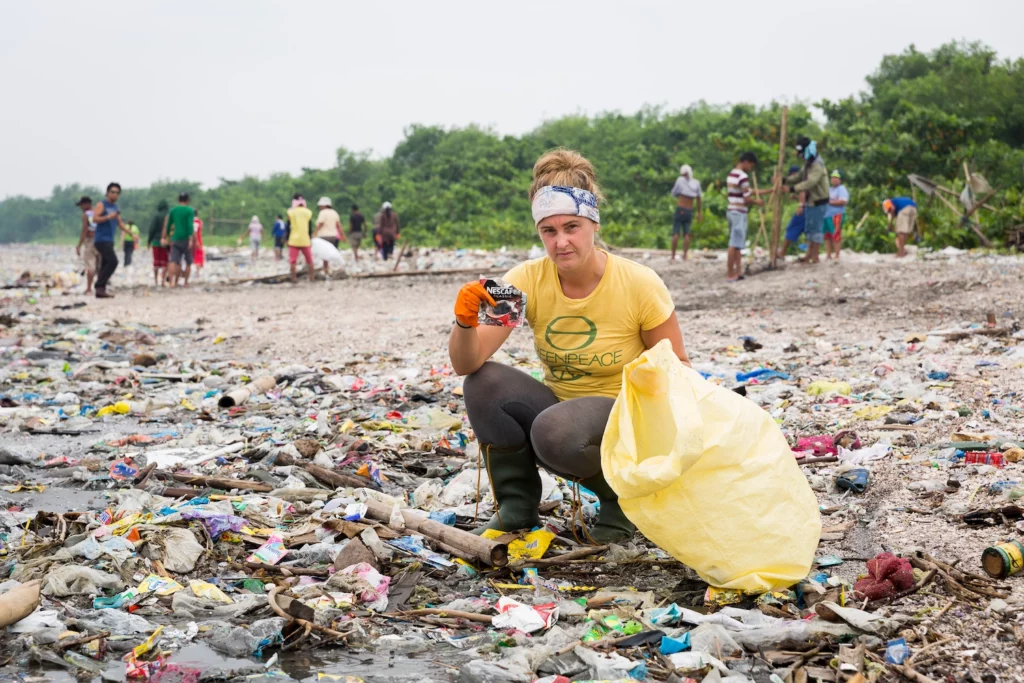
Sarah King has built her career around activism. Now, she's advocating that Canada take the lead on a global plastics treaty for a greener future. Photo by Daniel Müller/Greenpeace
"In 2022, global governments agreed on a mandate to start negotiating a treaty to end plastic pollution," King explains. And Canada has played a pivotal role, pushing for a legally binding treaty that tackles plastic across its entire lifecycle.
Although Canada has taken action nationally to try to address the problem of plastics, they haven’t gone far enough, she says. “Canada's quite proactive in working with other governments to find common ground and a way forward on the treaty. So we’re pressing Canada to take a more firm stance in their position on key issues like the need to cut plastic production globally.”
Opposing factions and complex global politics have to date hindered progress, but King remains undeterred. "Engaging and mobilizing the public is critical to our work," she emphasizes, detailing Greenpeace’s efforts to keep public interest alive. “When it comes to the plastics treaty, there are a lot of things at play, and obviously the fossil fuel industry is arguably the most powerful lobby that exists.”
King’s work at Greenpeace aims to ensure that countries remain accountable, industries are regulated and consumers are informed. “With the treaty, we really need to see binding targets established,” King says, pointing out that enforceable laws established at these UN talks could revolutionize corporate responsibility and environmental stewardship.
The possibility for change is what keeps King going. “There's the clear fact that every week, there are new scientific studies coming out about how plastic is not only everywhere, but it's causing X, Y and Z potential new problems, either from a human health perspective or an environmental health perspective. There's just constant reminders that this is impacting all of us.”
Bustamente echoes the sentiment. "We may not have anticipated the scope when we started," says Bustamente. "But the passion and purpose carried us forward."
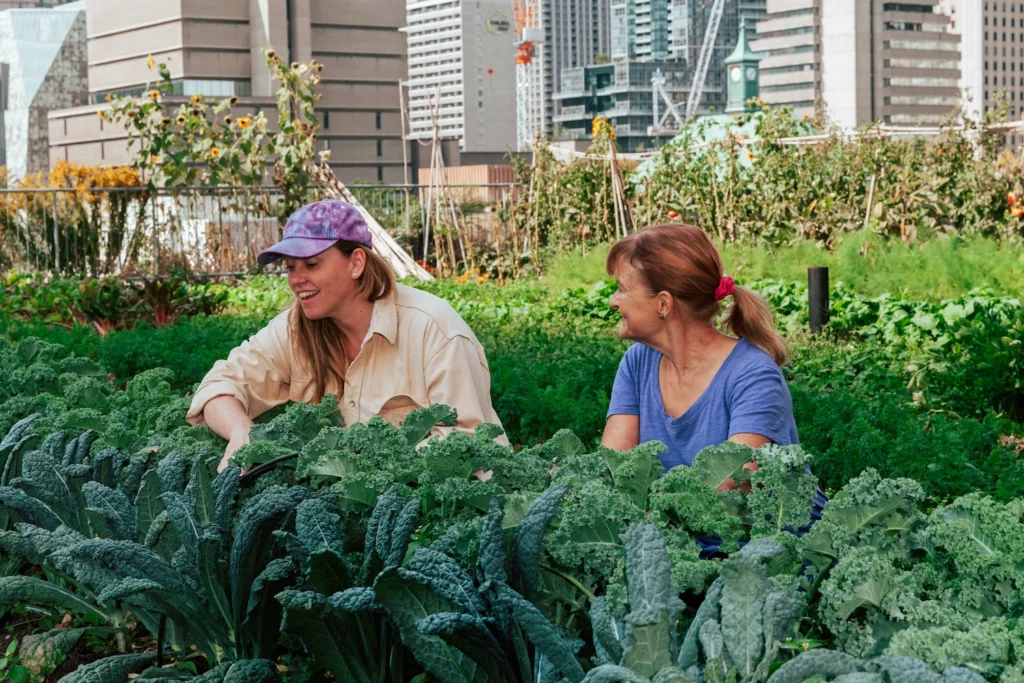
Arlene Throness (left) and Kristiina Mai in the Urban Farm. Photo by Wynne Neilly
Behind the work of all three TMU community members lies the hope for a brighter, greener future. “It's not only an opportunity for healthy local food, using real estate that is already available here, says Mai, “but it's also an opportunity to have community-based farming, just that connection to nature. It's to me, a real opportunity for people to get reconnected with them in such a huge sprawling urban centre like Toronto.”


